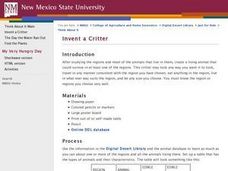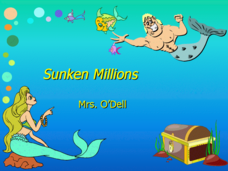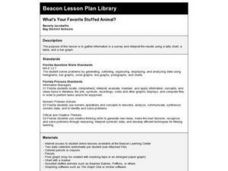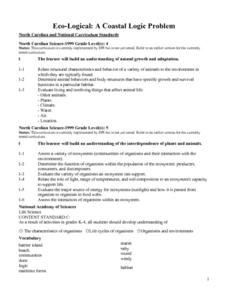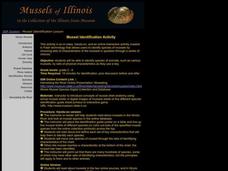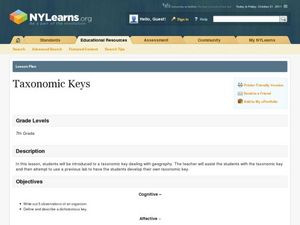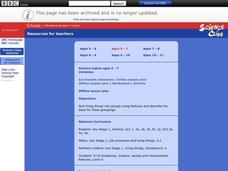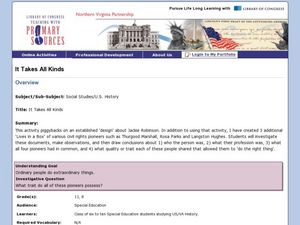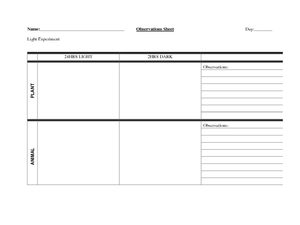Curated OER
Invent a Critter
Students create a living animal that could survive in at least one specific region and use the digital desert library to gather information. In this invent a critter lesson, students draw a picture of their animal, describe their animal...
Curated OER
Sunken Millions
This PowerPoint provides a game show format with multiple choice questions about fresh and salt water. Topics include sources of water, water geography, uses of water, and the water cycle.
Curated OER
Amusing Animal Adaptations
Learners identify how animals adapt characteristics to help them survive or reproduce. In this animal instructional activity, students draw pictures of their animal and adaptation.
Curated OER
Mussel Identification Activity
Pupils identify given species of animals, such as various
mussels, by sets of physical characteristics as they use a key. They also read about mussels on the Illinois River and look at mussel species in the online database. Finally,...
Curated OER
Animal Classification
Students classify animals. In this animal classification instructional activity, students identify characteristics from each of the 5 categories of vertebrates. Students group animals by categories.
Curated OER
What's Your Favorite Stuffed Animal?
Second graders gather information in a survey and interpret the results using a tally chart, a table, and a bar graph. They' present their results of the during the final group discussion. The subject of the survey is favorite stuffed...
Curated OER
Mallard's Wet Olympics
Students investigate some of the different characteristics of living things. They make observations from reading and interactive media. Students observe that animals move in different ways and have adaptations to aid in that action.
Curated OER
Who's There
Fifth graders, in groups, make a list of at least three animals that would survive well in a particular environment. After an allotted time, they pass their list to another group, where they will add to it. They discuss adaptations each...
Curated OER
Terrestrial Communities
Young scholars watch a video about different terrestrial communities. They conduct an experiment with sponges conserving water. They research desert characteristics comparing them with other biomes.
Curated OER
Eco-Logical: A Coastal Logic Problem
Fourth graders study the characteristics of five coastal communities. They use logic cards and matching activities to identify the proper community for plant and animal species.
Curated OER
Mussel Identification Activity
Students participate in an activity in which they identify mussels by choosing a set of characteristics. They review the parts of a mussel before and after the activity. They complete a worksheet to finish the activity.
Curated OER
Taxonomic Keys
Seventh graders create their own dichotomous key. In this biology lesson, 7th graders classify animals based on their observable features. They explain how to use their dichotomous key.
Curated OER
What Are You Doing Here?
Students draw scenes of different environments and create unexpected visitors in those environments. They reinforce their understanding of the characteristics of different environments and the animals that do or do not live in these...
Curated OER
Tackling Taxonomy
Students study physical characteristics of separate phyla and place them into similar groups. This lesson is part of a multi-segmented unit on the diversity of life. students develop a classification system by grouping animals into...
Curated OER
Variation
Students practice sorting living things into groups using their characteristics. Using pictures of leaves and animals, they sort them based on their color and shape and write the objects characteristics under the picture. They share...
Curated OER
Photomosaic Pixel Composite
Students research the habitat, diet, life cycle, and characteristics of an animal, and create a Japanese scroll painting of their animal. Using scanned images of animals they have painted, they create a composite mosaic using PowerPoint.
Curated OER
Glue-line Insect
First graders explore characteristics of ladybugs. They view ladybugs in ventilated containers and discuss their observations. Students read a story about ladybugs and create a glue picture of a ladybug.
Curated OER
Animal Classes-Mammal Birds Fish Reptiles Amphibian
Students learn about the characteristics of each animal classification. In this animal classification activity students will first learn the characteristics of each classification. Then, they will find animals from given materials and...
Curated OER
It Takes All Kinds!
Students view video clips and observe similarities and differences between animals. They sort animals into groups for a zoo. They make a graph of their observations and review scientific classifications.
Curated OER
Mother Nature's Laboratory
Learners research how various plants and animals adapt over time to specific habitats and for specific purposes. Students produce a pictorial report on an example of an animal or plant's adaptation.
Curated OER
Survival
Learners identify characteristics of Australia, Africa and Antarctica and compare and contrast them to each other. They work together to identify adaptations that animals have used to survive. They also practice classifying animals.
Curated OER
Ani-mania
Students view and discuss Robert Harris' farm landscapes and create their own mural out of wood. In groups, they discuss various issues affecting pets throughout the world and create a way to protest or celebrate the issue. They try to...
Curated OER
Organisms – Their Needs
Students compare and contrast different organisms characteristics. In this life science lesson, students design an experiment about plants and animals needs. They collect data and write their conclusion about the experiment.
Curated OER
Sorting Pond
Pupils practice balancing while learning the classifications of different animals


